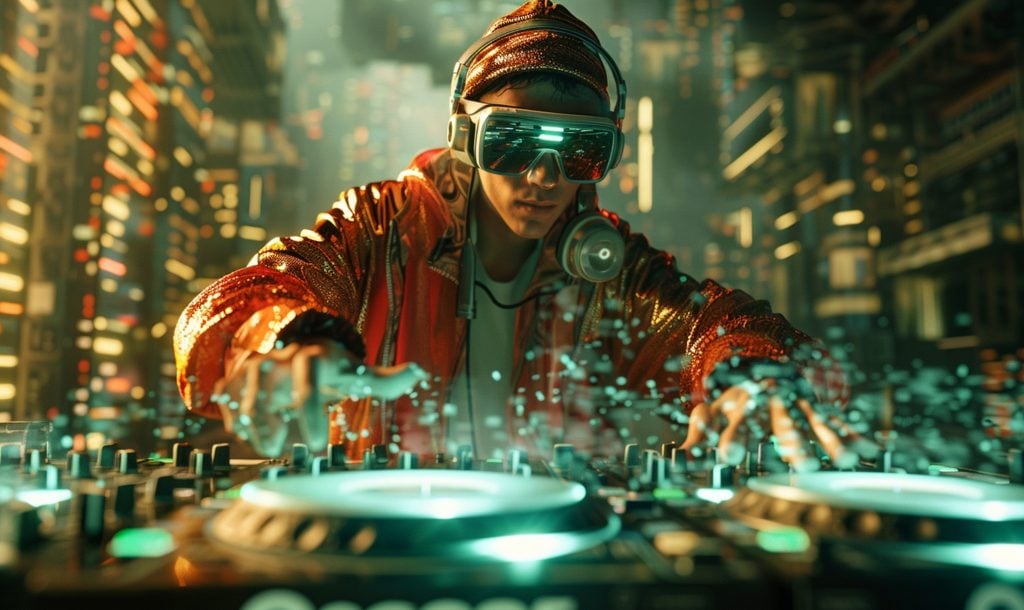The music industry is undergoing a revolutionary transformation, not just because of the latest hit songs but due to the emergence of hyper-real AI covers. Imagine Ariana Grande lending her iconic voice to perform Kendrick Lamar tracks. As this groundbreaking technology gains momentum, it prompts a significant question: with AI-generated covers becoming mainstream, who really gets paid? 🎤🤔
The Rise of hyper-real AI covers in Music
Artificial intelligence has become a powerhouse across various sectors, and the music industry is no exception. AI’s ability to create hyper-realistic renditions of songs by imitating famous artists’ voices has opened up vast possibilities. However, it also presents challenges regarding copyright, artist compensation, and the future of music creation.
The Allure of AI Covers
The idea of hearing Ariana Grande’s voice on a Kendrick Lamar track is exhilarating for fans, offering a fresh perspective on beloved songs. These hyper-real AI covers captivate listeners with their uncanny precision, but they also challenge traditional concepts of artistic ownership. As AI-generated music gains traction, it blurs the lines between creator and machine, raising complex legal and ethical questions.
Trending Reactions from Social Media
Social media platforms like Reddit and TikTok are abuzz with opinions. Some users express awe at the technology, while others voice concerns about its implications.
- “This is mind-blowing! Can’t wait to hear more AI covers. 🤩🎶” – TikTok User
- “Feels like we’re opening a can of worms with this AI stuff. Who’s gonna get paid for this? 🤔💸” – Reddit User
Who Holds the Rights?
A central issue with hyper-real AI covers revolves around rights and royalties. When an AI-generated Ariana Grande sings a Kendrick Lamar song, who should receive compensation? Is it the original artist, the AI developer, or both?
Copyright and Legal Challenges
Current copyright laws struggle to keep pace with rapid technological advancements. Traditionally, royalties are distributed to songwriters, performers, and producers. However, AI-generated music introduces a new player: the AI itself. This raises questions about royalty distribution and whether new regulations are needed to address these complexities.
Industry Perspectives
Opinions among industry experts vary. Some argue that hyper-real AI covers should be treated like any other cover song, with royalties paid to original creators. Others believe AI developers deserve compensation for their role in crafting these unique, machine-generated renditions.
The Future of Music Creation

As AI technology evolves, it could transform the music industry in unprecedented ways. From crafting hyper-real AI covers to collaborating with virtual musicians, artists might use AI to experiment with new sounds or even create entire albums without leaving their studios.
Potential Benefits
- Creative Exploration: AI can help artists push creative boundaries by offering new ways to experiment with music.
- Accessibility: Aspiring musicians with limited resources could use AI to produce high-quality tracks.
- Customization: Fans might one day request personalized versions of songs, tailored to their preferences.
Ethical Considerations
While AI in music presents exciting opportunities, ethical concerns must be addressed. Artists may fear losing control over their work, and the industry must grapple with the implications of AI-generated content.
Cultural Impact
AI covers have the potential to democratize music creation, allowing more voices to be heard. However, balancing innovation with preserving artistic expression’s integrity is essential.
Conclusion: Navigating the AI Music Revolution
As AI covers become more prevalent, the music industry must adapt. This involves thoughtful discussions about royalties, copyright, and AI’s role in music creation. Ultimately, the goal should be to harness AI’s potential while ensuring fair compensation for artists and protecting their creative rights.
FAQ
Q1: How are AI covers created?
AI covers are generated using sophisticated algorithms that analyze and mimic artists’ vocal patterns. This technology can produce realistic renditions of songs, making it appear as though a different artist is performing the track.
Q2: Do AI-generated songs require permission from original artists?
Typically, AI-generated covers should adhere to existing copyright laws, seeking permission from original artists or rights holders. However, the legal landscape is still evolving to address these new challenges.
Q3: Can AI replace human musicians?
While AI offers exciting possibilities, it is unlikely to replace human musicians entirely. Music is inherently human, and the emotional connection between artists and audiences remains irreplaceable.
For more on the latest in tech and music, check out this trending piece on BigTrending.com.








